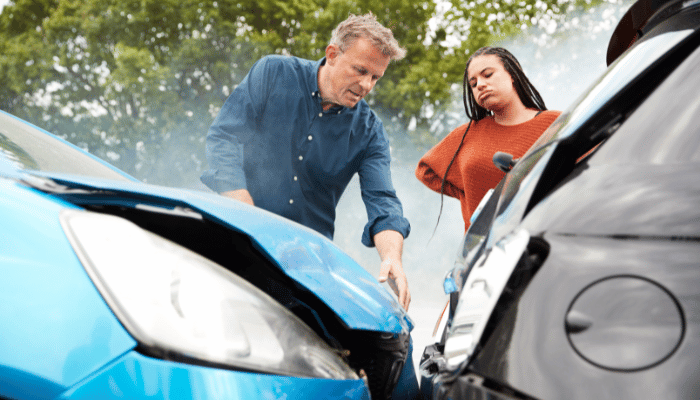Being rear-ended in a car accident can be startling and unsettling. Knowing how to handle the situation immediately after the impact is crucial for your well-being. From assessing the damage, to contacting the authorities and obtaining a medical assessment, each step taken post-accident can be vital in your health and safety.
Assessing the Scene of the Accident
Move to a Safe Location:
If the accident is minor and the vehicles are drivable, move them to the side of the road or a safe area to avoid blocking traffic. Turn on hazard lights to alert other drivers. Moving to a safe location prevents further accidents and ensures everyone’s safety.
Stay Calm and Evaluate for Injuries:
After a rear-end collision, it’s vital to stay composed. Assess yourself and passengers for any injuries. Even if you feel fine initially, some injuries, like whiplash or internal trauma, may not present immediate symptoms. It’s crucial to gauge your physical condition. Immediate assessment allows you to identify potential injuries that might not be immediately apparent. Seeking medical attention promptly can prevent complications.
Check for Vehicle Damage:
Inspect your vehicle for damage. Look for visible signs like dents, scratches, or misalignment of bumpers. Take photos or videos of the damage for documentation purposes. Documenting the vehicle’s damage helps in insurance claims and provides evidence of the collision’s impact.
Contacting the Authorities
Call the Police:
Regardless of the accident’s severity, contact the police. They will document the incident, assess the scene, and file a report. This report is essential for insurance claims and legal proceedings. A police report provides an official record of the accident, aiding in insurance claims and determining fault.
Exchange Information:
While waiting for the police, exchange information with the other driver involved. Gather their name, contact details, insurance information, and license plate number. Avoid discussing fault or apologizing for the accident. Exchanging information allows for smooth processing of insurance claims and ensures communication for any further inquiries.
Seeking Medical Assessment
Get a Medical Evaluation:
Even if you don’t feel injured immediately after the accident, seek a medical assessment. Some injuries, like whiplash or concussions, might have delayed symptoms. Visiting a healthcare professional ensures any underlying injuries are detected and treated promptly. Prompt medical attention helps diagnose hidden injuries and initiates treatment, preventing complications.
Document Symptoms:
If you decide to pursue medical attention, document any symptoms or discomfort after the accident. This information assists healthcare providers in accurate diagnosis and treatment. Documenting symptoms helps healthcare providers understand the extent of injuries and provides necessary information for treatment.
Symptoms May Include:
Pain and Discomfort:
- Neck pain or stiffness (indicative of whiplash)
- Back pain
- Headaches or migraines
- Abdominal pain or tenderness
- Chest pain
Physical Changes:
- Difficulty moving limbs or extremities
- Numbness or tingling sensations
- Limited range of motion in joints
- Bruising or swelling
Concussion Symptoms:
- Headaches or dizziness
- Blurred vision or sensitivity to light
- Difficulty concentrating or remembering
- Nausea or vomiting
- Changes in mood or behavior
Internal Injury Indicators:
- Difficulty breathing
- Abnormal heartbeat or chest discomfort
- Abdominal swelling or bruising
- Blood in urine or stool
Emotional and Psychological Changes:
- Anxiety or panic attacks
- Difficulty sleeping or changes in sleep patterns
- Mood swings or irritability
Cognitive Changes:
- Memory lapses or forgetfulness
- Difficulty concentrating or staying focused
- Confusion or disorientation
Other General Symptoms:
- Fatigue or exhaustion
- Changes in appetite or eating patterns
- Increased stress or emotional distress
Contacting Stridewell for Assistance
Seeking Professional Guidance:
After being rear-ended, consider seeking professional guidance from experts like Stridewell. Contact us as soon as possible to schedule a comprehensive evaluation. Our team specializes in diagnosing and managing injuries resulting from car accidents. Seeking professional evaluation ensures comprehensive assessment and appropriate treatment for any injuries sustained.
Insurance and Legal Support:
Stridewell can assist in navigating insurance claims and provide guidance on legal aspects related to the accident. Our expertise ensures you receive proper medical care and necessary support throughout the claims process. Stridewell’s expertise helps in navigating complex insurance procedures, ensuring fair compensation for injuries.
Moving Forward After Being Rear-Ended
Experiencing a rear-end collision can be overwhelming, but taking these steps can make a significant difference in handling the aftermath effectively. Ensuring safety at the scene, seeking medical evaluation, and contacting professionals like Stridewell for support are key in managing the situation after being rear-ended.
read article



